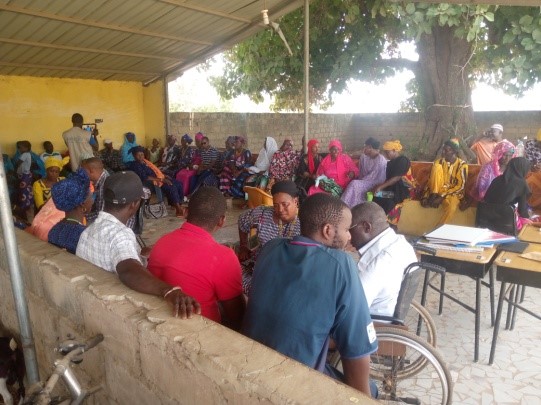By Ndey Sowe
The National Nutrition Agency (NaNA), in partnership with the Department of Community Development (DCD) and the Directorate of Social Welfare (DSW), continue to extend the comprehensive training they have started for Interpersonal Communication (IPC) networks in the Central River Region (CRR) North and South and the Upper River Region (URR) respectively, on social and behavioral change communication (SBCC) tools and materials.
The initiative forms part of the broader ‘Nafa’ program—a key sub-component of the Gambia’s Resilience, Inclusive and Equitable Social Protection project (RISE), which is jointly funded by the World Bank and the Government of The Gambia. Targeting 20 poorest districts in the country, the program reaches approximately 17,000 extremely poor households, offering them bi-monthly cash transfers alongside SBCC activities to promote positive behavioral change.
The modules covered in the training include basic information on the RISE project, maternal and child health nutrition, positive playful parenting, Gender-based violence, early childhood development, entrepreneurship and financial literacy, and agriculture and climate change. The modules are expected to be shared with community members especially parents, after the training.
Fatou Drammeh, who works at the SBCC Directorate at NaNA, explained that the training is going to be done in batches and each batch will be trained for four days; that under the RISE project, they will implement component three which is ‘Nafa’ and SBCC. She said the training of IPCs cannot be overemphasized because they are the ones creating awareness in the communities where they exist, about the project.
“We also want them to do certain things such as community work plans on how they are going to be conducting their awareness creation in the communities,” she said, adding that quarterly, the trainees will be monitored to track the progress of the project.
Sherrifo Secka from the Department of Community Development and trainer in one of the sites, said they have 47 trainees from five different communities who were successfully trained as par the evaluation available at the site; that the sessions during the training were very interactive between trainers and trainees.
“I hope those who have been trained will filter down the knowledge at community’s level to help attain the goals and objectives of the project,” Mr. Secka said; that monitoring will continue for those IPC’s to ensure that they also work by their plans and ensure every individual in the community has the knowledge.
Koddy Chatty, a beneficiary who spoke on behalf of the participants, said they are working towards better and excessive breast feeding activities in their various communities.
“Today is my fourth day at the training and I am excited and happy to be part of the training. Learning is beneficial and now that we have benefitted from these training, I can assure you that I will convene the materials and tools learned to the rest of my community,” she said.
While commenting on the World Bank and The Gambia government for funding the training, Ms. Chatty hailed NaNA and partners for giving them the opportunity to gain knowledge in interpersonal communication skills.
Ebrima Dibba, program officer for Monitoring and Evaluation said: “We are targeting to train 1,256 IPCs in CRR South. We have just concluded our first batch for the training, during the past four days, and we have taken them through modules established by the project, to help us build resilience of households.
Kebba Jatta, from the Directorate of Social Welfare under the Ministry of Gender, Children and Social Welfare, said the training is timely and important as far as IPC networks are concerned.
Interpersonal Communication (IPC) Networks also known as Village Support Groups (VSGs) are key partners in the implementation of the ‘Nafa’ program. They help get in touch with household members and engage communities on issues that relate to the SBCC component of the project.
The ongoing IPC training organized across 160 sites nationwide, engages 802 communities from all Regions in the country, marking a significant step in building resilience and informed grassroot networks.


















